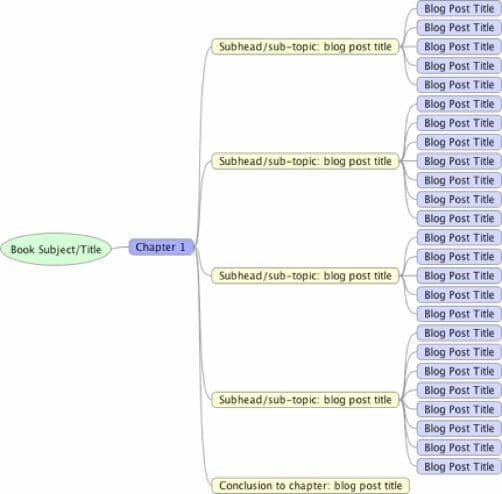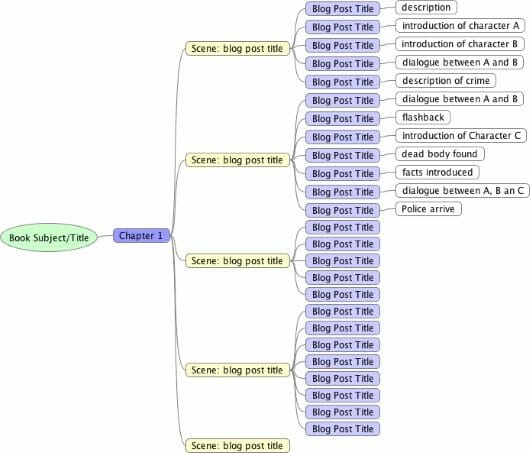By Nina Amir
As a blogger, you are uniquely suited to become an author. If you have a successful site, meaning one with a large and engaged readership, you have set up yourself to produce bestselling books.
You can use your blog effectively to transform yourself from blogger to author. Either blog a book or book a blog. (I wrote about how to turn your blog into a book-production machine in this post.)
While the idea of writing a book intentionally post by post on your blog—blogging a book—or repurposing previously published posts into a book—booking a blog—might seem simple enough, many bloggers find the process overwhelming. After all, blogging a book is not much different from writing a book. And booking a blog takes a fair amount of thought and effort; you have to gather together posts that were written randomly on your site and make them work together as a cohesive whole (a manuscript).
Plus, most bloggers skip the most important step: preparation. You have to do the upfront work so the book you produce on or from your blog comes together into a product that will sell. Whether you produce a manuscript in posts published on your blog or pull material off your blog to accomplish the same task, you have to end up with a book that targets your market and provides something unique and necessary in a bookstore category. Simply said, you must produce a marketable book.
This post gives you the information you need to succeed at blogging a book or booking a blog. It provides you with the steps you must take to prepare your project so you can easily complete it and produce an end product your readers will want to buy.
The Number One Reason Blog-to-Book Projects Fail
Most bloggers want to book their blogs. They have a ton of content produced by many years of blogging, but they don’t think through their projects before starting. They decide a book resides in their blog and begin copying and pasting old posts into a new manuscript.
Those who want to blog books make a similar mistake. They get an idea for a book, decide to blog it, and start. They don’t do any planning; they just make a mad dash for the keyboard. Before they know it, the first post—or first 50—are published on the blog.
In both these scenarios, the bloggers failed to do any preparation prior to writing. They didn’t plan the best book possible, which sets them up for failure. The books they produce on or from their blogs are likely to be sub par. That means they won’t sell well.
That’s the first step: preparation. Initial planning helps you craft the best-possible book idea, a viable book structure, and a content plan. Once you know you have a marketable book idea, a sound book structure to go with it, and a content plan that provides the material to carry out that idea, it’s time to write. Not a moment before—and that goes for any book you write in any manner.
The Preparation
So, how do you plan your blog-to-book project? Although the steps for blogging a book are similar in some ways to booking a blog, let’s start with blogging a book.
- Choose a subject. The first part of your plan involves choosing a subject. You may be thinking, “That’s stupid. I will just blog a book about the topic of my blog or the topic I feel passionate about or interested in at this moment.” You need to choose a blogged-book topic that you can blog about for a long time. You continue blogging on the topic long after you finish blogging the book. Yes, you should be passionate about the topic and interested in it—but for an extended period. Plus, the topic must be one that is of interest to your potential readers. That brings us to the next planning step…
- Create a business plan for your book. This step is so important that I wrote a whole book about it. Every book needs a business plan, but this is especially true if you plan to self-publish. The traditional publishing industry has a business plan for each book, and it starts with the author’s book proposal. Used correctly the information in this business plan helps you do two things: evaluate your idea to determine if it is marketable and craft the best book possible—a book that will target your market, be unique and necessary in its category, and, therefore, sell.
To create your business plan, use a nonfiction book proposal as your foundational document. It contains all the elements to help you evaluate your book idea for success.
- Create a pitch, list of benefit and a brief summary of your book. This helps you conceptualize your book idea and the value it will provide to readers in your target market.
- Write a reader profile and conduct a market analysis. This helps you understand what your readers need and want—and create content to provide them with these benefits. It also provides you with information on how to promote to them once your book is released.
- Conduct a competitive analysis. Studying the books (and blogs) that compete with the one you want to produce helps you understand what you need to make yours stand out from the pack. With the information from competitive analysis, you can craft a book that is unique and necessary in its bookstore category.
- Craft your book’s structure and content. Use the information in your business plan to brainstorm your book structure and content. Apply your creativity and craft to the information you gathered and create a table of contents. Then write chapter summaries.
- Hone your book idea. Take a big-picture view of what you created in your business plan—from the pitch down to the chapter summaries. Does everything line up? Will the content provide the benefits you outlined? Does the pitch and book summary describe the book you planned out? And does that final book structure and content target your ideal reader and market and fill a hole on the bookstore shelf?
- Break your content into post-sized pieces.
- Set up a blog.
- Promote your blog.
Now, let’s say you are booking your blog instead. I wrote a post on this site on how to mine your blog for publishable content, but here are the steps:
- Choose a topic related to your blog.
- Create a business plan for your book. In the process, craft the best-possible book idea—not the easiest book you can produce from existing posts. (This includes determining your book’s structure and content and deciding if your idea is marketable—or how to make it so.)
- Search your blog for existing posts that meet the requirements of your book plan.
- Fill in content gaps with new material you did not find on your blog.

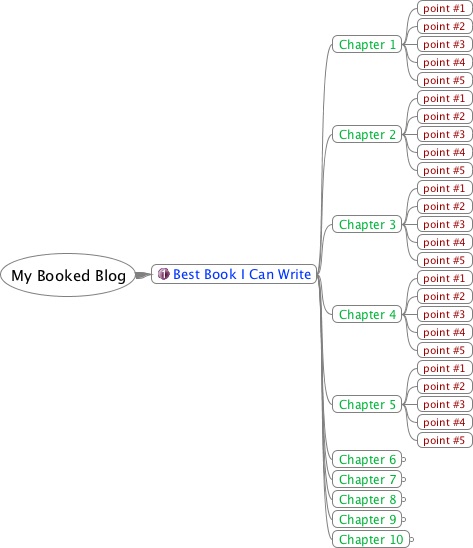
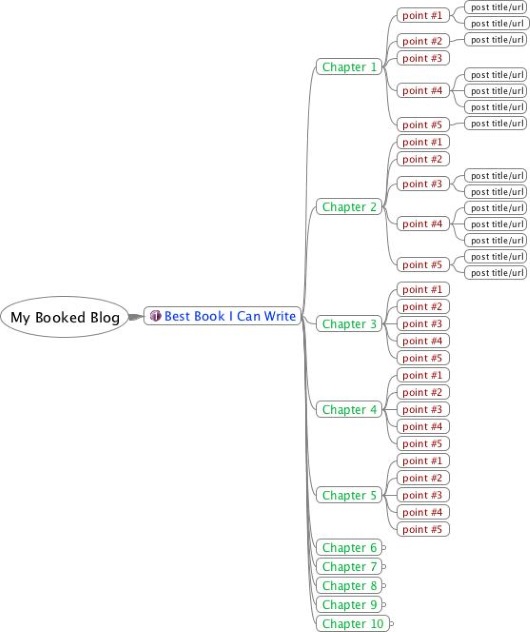
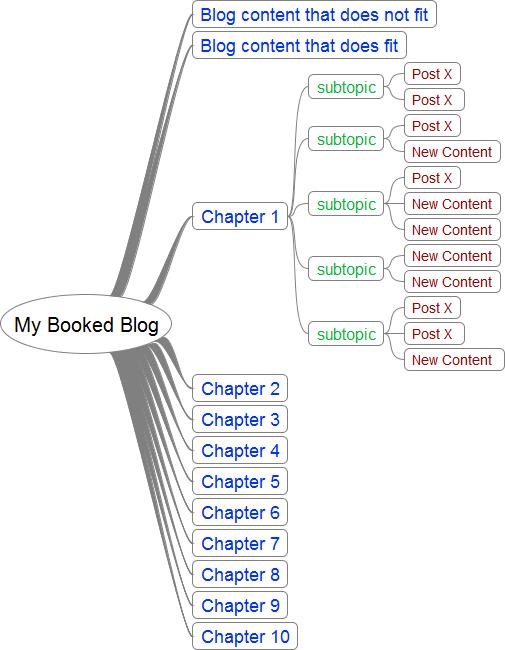
To learn more about blogging book and booking blogs, purchase a copy of How to Blog a Book Revised and Expanded Edition in the Writer’s Digest Shop.
 Nina Amir, the Inspiration to Creation Coach, is the bestselling author of How to Blog a Book and The Author Training Manual. A speaker, blogger, and author, book, blog-to-book, and high-performance coach, she helps people combine their passion and purpose so they move from idea to inspired action and positively and meaningfully impact the world as writers, bloggers, authorpreneurs, and blogpreneurs. She is the founder of National Nonfiction Writing Month, National Book Blogging Month, and the Nonfiction Writers’ University.
Nina Amir, the Inspiration to Creation Coach, is the bestselling author of How to Blog a Book and The Author Training Manual. A speaker, blogger, and author, book, blog-to-book, and high-performance coach, she helps people combine their passion and purpose so they move from idea to inspired action and positively and meaningfully impact the world as writers, bloggers, authorpreneurs, and blogpreneurs. She is the founder of National Nonfiction Writing Month, National Book Blogging Month, and the Nonfiction Writers’ University.
To find out more about Nina and get a free goal-achievement e-book, visit www.ninaamir.com.
Photo: bigstockphoto.com. Amazon links contain my affliliate code.

